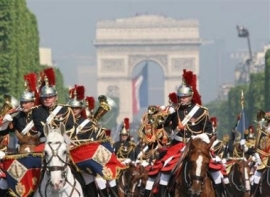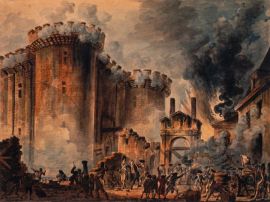In the wake of the 11 July dismissal of Jacques Necker, the people of Paris, fearful that they and their representatives would be attacked by the royal military, and seeking to gain ammunition and gunpowder for the general populace, stormed the Bastille, a fortress-prison in Paris which had often held people jailed on the basis of lettres de cachet, arbitrary royal indictments that could not be appealed. Besides holding a large cache of ammunition and gunpowder, the Bastille had been known for holding political prisoners whose writings had displeased the royal government, and was thus a symbol of the absolutism of the monarchy.
As it happened, at the time of the siege in July 1789 there were only seven inmates, none of great political significance.
When the crowd — eventually reinforced by mutinous gardes françaises — proved a fair match for the fort’s defenders, Governor de Launay, the commander of the Bastille, capitulated and opened the gates to avoid a mutual massacre.
However, possibly because of a misunderstanding, fighting resumed. Ninety-eight attackers and just one defender died in the actual fighting, but in the aftermath, de Launay and seven other defenders were killed, as was the ‘prévôt des marchands’ (roughly, mayor) Jacques de Flesselles.
Bastille Day celebrations in other countries
- Hungary
Two day celebration in Budapest, sponsored by the Institut de France.
- South Africa
Franschhoek’s week-end festival has been celebrated for the last 15 years. [Franschhoek meaning ‘French Corner’ is situated in the Cape Province]
- United States
New York City has a large Bastille Day celebration each year on 60th Street on the Upper East Side of Manhattan.
San Francisco has a large celebration in the downtown historic French quarter.

The storming of the Bastille was more important as a rallying point and symbolic act of rebellion than a practical act of defiance.
Shortly after the storming of the Bastille, on the 4th of August, feudalism was abolished and on August 26th, the Declaration of the Rights of Man and of the Citizen proclaimed.




 the road through alcoholism
the road through alcoholism WikiLeaks
WikiLeaks Cooking with Karma
Cooking with Karma American Killers
American Killers Artistic thoughts
Artistic thoughts Best of Craig’s List !
Best of Craig’s List ! .
.


















